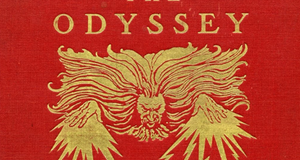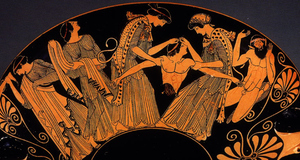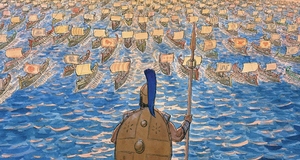The Many Faces of Odysseus in Classical Literature
By
2015, Vol. 7 No. 03 | pg. 2/2 | « Ultimately, Odysseus’ questionably feigned concern and respect for his rival’s corpse can be viewed as just another vehicle for doing what he needs to do to serve himself. Therefore, Odysseus is portrayed by Sophocles as the quintessential opportunist – he takes the expedient route and achieves his ends by whatever means necessary, without regrets. Accordingly, Odysseus is represented as a selfish figure with impure motives in Sophocles’ Ajax. In Virgil’s Aeneid, Odysseus’ deceitfulness becomes evident when he employs a scheme to win the Trojan War. Odysseus craftily fabricates and executes a plan to construct a wooden horse that enters the fortified Trojan walls by night and wreaks havoc (Virgil 2.326-337). Due to his actions, Odysseus is presented as a highly devious and self-serving man, and his ability to orchestrate such a feat lends him an air of shrewdness. In essence, the fact that Odysseus, or Ulysses, successfully carries out his plan to completion serves as a testament to his cunning and acumen. Moreover, his strategy to have Greek warriors stealthily hide inside the structure and assail the city from within demonstrates an extreme depiction of Odysseus as a wily and capable general. By virtue of this plan, the Greeks win the war, thereby branding Odysseus an effective and calculating man. In addition, the juxtaposition between Odysseus and Aeneas further accentuates the former’s deceitful qualities, as Aeneas’ character traits directly counter those of Odysseus. For instance, Aeneas abandons dreams of a future with his wife and personal happiness in order to fulfill his civic duty:“But Aeneas is driven by duty now … still, moaning deeply, heart shattered by his great love, in spite of all he obeys the gods’ commands and back he goes to his ships” (Virgil 4.494-500). When desire and duty clash, Aeneas does not trick his way out of this problem through cunning but, rather, rises above basic human instincts in order to fulfill the gods’ wishes, placing theirs before his own by ultimately going on to found Rome. Rather than scheming to somehow maintain his old life, Aeneas decides that duty trumps desire and that he must leave his wife, Dido, accordingly. In contrast to Aeneas’ straightforward compliance with the gods’ demands, Odysseus is fully armed by his own cunning and does not hesitate to concoct clever ruses (i.e. the Trojan Horse plan) in the face of obstacles. Ultimately, Virgil’s incorporation of such clashing personality traits into the Aeneid reaffirms Odysseus’ deceitfulness. Thus, the juxtaposition of Odysseus and his dramatic foil, Aeneas, serves to amplify the depiction of Odysseus as a cunning man. Moreover, Odysseus can be characterized as an extremely scheming man in the Aeneid, as Virgil alludes to the former’s use of sharp intellect and continues to do so by indirectly contrasting Aeneas with Odysseus. Finally, in Hecuba, Euripedes portrays the Greek commander, Odysseus, as indifferent and discourteous: he treats the unstable Hecuba, his slave and the former queen of Troy, inhumanely, and, in so doing,completely and permanently digresses from any moral compass he might have possessed. For instance, upon retrieving Polyxena, daughter of Hecuba, for her sacrifice on Achilles’ tomb, Odysseus lectures Hecuba on how she should behave: “Understand the misery that surrounds your life. It is wise to be circumspect even in such moments of misery” (Euripides 227-228). The casual and indifferent tone with which he commands her not to get upset connotes his callous, ill-mannered nature. Not only does Euripides depict Odysseus as socially inappropriate, but he also offers direct evidence supporting the notion that Odysseus navigates strictly by a compass that points in the direction of self-interest. Hecuba (Hekabe) interrogates Odysseus about past times when their roles were reversed and he was the one pleading for his life. In response, Odysseus states, “I’ve told you many things. All sorts of cunning words, to escape my death” (Euripides 243-246). Odysseus concedes that he accomplished that which he needed to do in order to survive; his response smacks of egocentrism and impure motives, and this passage only further buttresses one of the established depictions of Odysseus as a relentless opportunist. He overtly confesses to his devious maneuvers, the guises that he wears and, tacitly reveals a sense of apathy towards all other living creatures aside from himself. Furthermore, as the conversation progresses and reaches its climax, Hecuba reaches her breaking point, emphatically vilifying him and his cohorts as an “ungrateful lot” who do not consider the feelings of others (Euripides 254-257). Upon bursting into a tirade against Odysseus and men of his ilk and comparing him to politicians, she implies that he is a corrupt human being for not repaying her after she saved his life. Her words portray him negatively, as an avaricious man of meaningless gab who cares only for himself and feigns empathy for the poor. Odysseus continues to cast himself in a negative light when he callously responds to her desperate supplications to keep her daughter Polyxena alive. He avers that Greece “has its share of old men and women who suffer equally” and that the death of Polyxena will help Greece to thrive (Euripides 274-331). As evidenced by his response to Hecuba, he affords no compassion and stoops so low as to tell her that her misery is commensurate to that of others. This statement, in particular, depicts Odysseus as a scoundrel, as no person has the right to tell someone how much pain he or she may be feeling. Consequently, Odysseus’ remark is rife with condescending and malicious undertones. When Hecuba desperately reaches out to Odysseus in a last-ditch attempt and implores him to spare her daughter Polyxena– her only living family member left – doing so at the expense of her dignity, all that Odysseus can muster is an insensitive response, thereby appearing indifferent and incapable of feeling – essentially, evil. The fact that he cannot even sympathize with someone who saved his own life, let alone help her, truly attests to his depraved nature. Furthermore, by attempting to underplay Hecuba’s state of misery, Odysseus digs himself a deeper hole and does not evoke sympathy whatsoever from his audience. Thus, one can construe that Odysseus’ portrayal undoubtedly gravitates towards an extreme in this play. His rigidity and lack of human sentiment ultimately label him a self-interested, cruel, and insensitive individual. Euripides’ Chorus, Trojan women and Greek captives, support Hecuba by lambasting Odysseus and his attendant cruelty: “There is no man with heart so cruel that he can hear your groans and pitiful cries and not be moved to tears” (Euripides 296). Their harsh words imbue the reader with disgust directed towards Odysseus owing to his implacability. He appears unable to show even the slightest empathy and is regarded as an inhumane ectotherm by not only the audience, but also characters within the play. Therefore, due to Euripides’ interpretation of Odysseus, the latter continues to wilt in an extremely unfavorable light as a debased anti-hero. Odysseus demonstrates far more concern for a fallen demi-god (Achilles) than a living, breathing human being who has yet to experience a lifetime rife with love and memories. He honors a virtue, something utterly intangible, over a member of the human race – a testament to his indifference towards those who cannot further his goals. The fact that Odysseus chooses to cut an innocent youth’s life short for the sake of ingratiating himself with Achilles elucidates his “Achilles’ heel,” otherwise known as his excessive pragmatism. Euripides characterizes him as a weak scoundrel by describing him as incapable of carrying out justice and acting righteously when confronted by an expedient course for success. Essentially, Odysseus is portrayed as a man who cannot subdue his megalomaniac feelings in the face of potentially self-enriching schemes, therefore qualifying him as a spiteful figure through the lens of Euripidean readers. Hecuba even offers herself in place of her daughter for the sacrifice on Achilles’ tomb – the ultimate act of love – and gives him reason to tolerate this exchange. She reasons with Odysseus, stating that she gave birth to the man (Paris) that killed Achilles and is, therefore, the more appropriate candidate to suffer this demise (Euripides 386-387). However, Odysseus repudiates her selfless entreaty and, additionally, denies Hecuba’s request to die alongside her daughter so as to end her misery (Euripides 394-395), thereby appearing as a rigid and thoroughly abysmal person. Subsequent to Hecuba’s plea for death, Odysseus shows himself to be arrogant when he argues with Hecuba to release her daughter to him. He thinks of himself beyond reproach, particularly when he exclaims, “No, Hekabe. Listen to the words of those wiser than you” (Euripides 404). This blatantly self-aggrandizing remark conveys him as condescending, boastful man. In this play, Odysseus manages to pass up every opportunity to prove himself a decent human being and, in so doing, fails to redeem himself in the eyes of readers. Thus, Euripides successfully portrays Odysseus as an evil figure in Hecuba. In conclusion, Homer, Sophocles, Virgil, and Euripides distinctly depict Odysseus in extreme fashions, thereby illustrating that Odysseus’ character is readily subject to different interpretations by various authors. As evidenced, he is portrayed as cunning, shrewd, and evil because his traits are perceived and analyzed differently by various writers. Accordingly, the characterization of Odysseus throughout classical literature fluctuates along the color spectrum like a chameleon and serves as a testament to the versatility of this complex character. ReferencesEuripides. Hekabe (aka Hecuba). (2013). Bacchicstage. Finley, J. H. (1978). Homer's Odyssey. Harvard University Press. Stanford, W. B. (Ed.). (1963). Sophocles, Ajax. Macmillan. Theodoridis, G. (2009). Philoktetes (aka Philoctetes). Trans. Bacchicstage. Print. Hardie, P. R. (1986). Virgil's Aeneid: Cosmos and Imperium (p. 110). Oxford: Clarendon Press. Suggested Reading from Inquiries Journal
Inquiries Journal provides undergraduate and graduate students around the world a platform for the wide dissemination of academic work over a range of core disciplines. Representing the work of students from hundreds of institutions around the globe, Inquiries Journal's large database of academic articles is completely free. Learn more | Blog | Submit Latest in Literature |


















